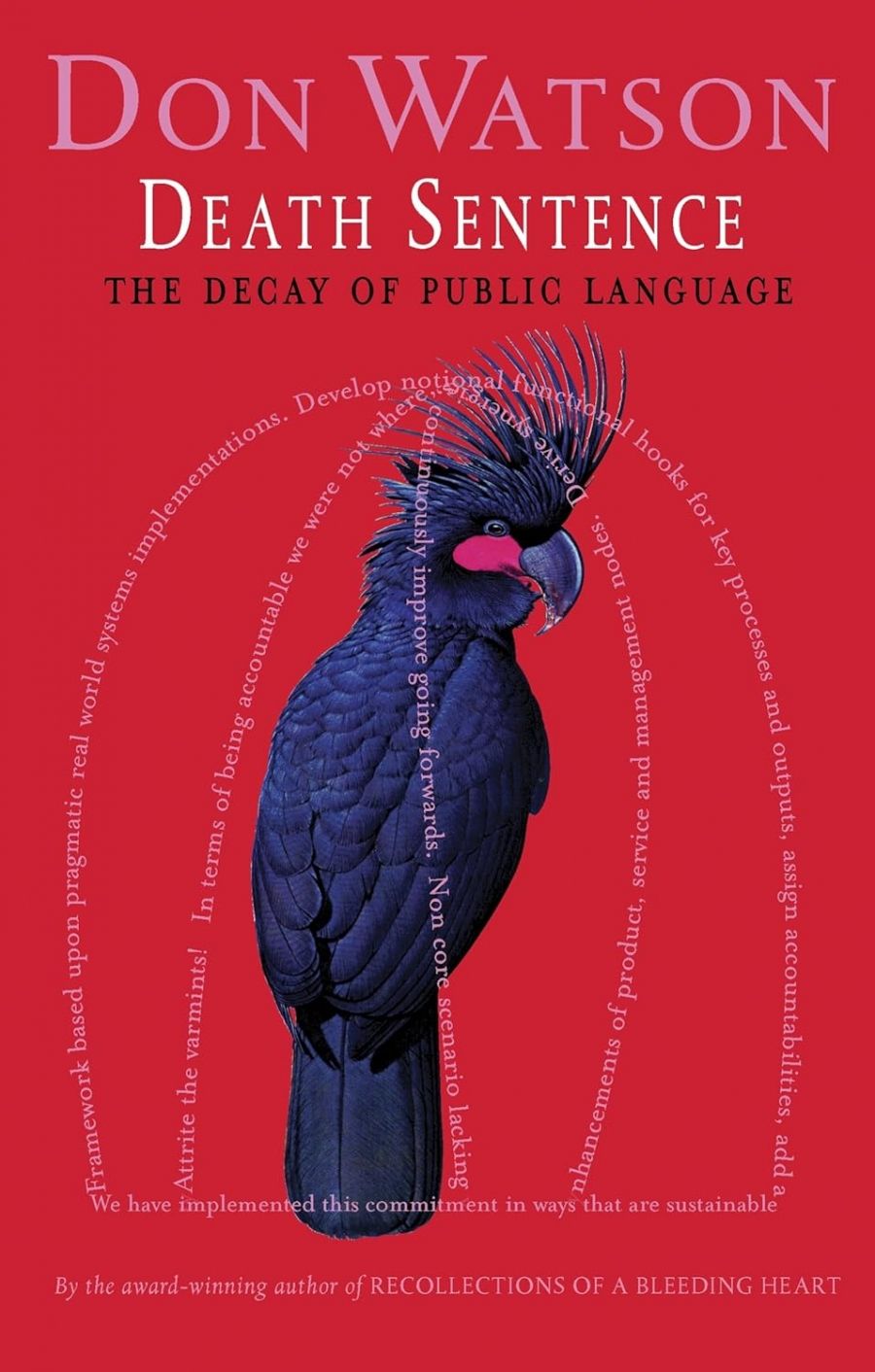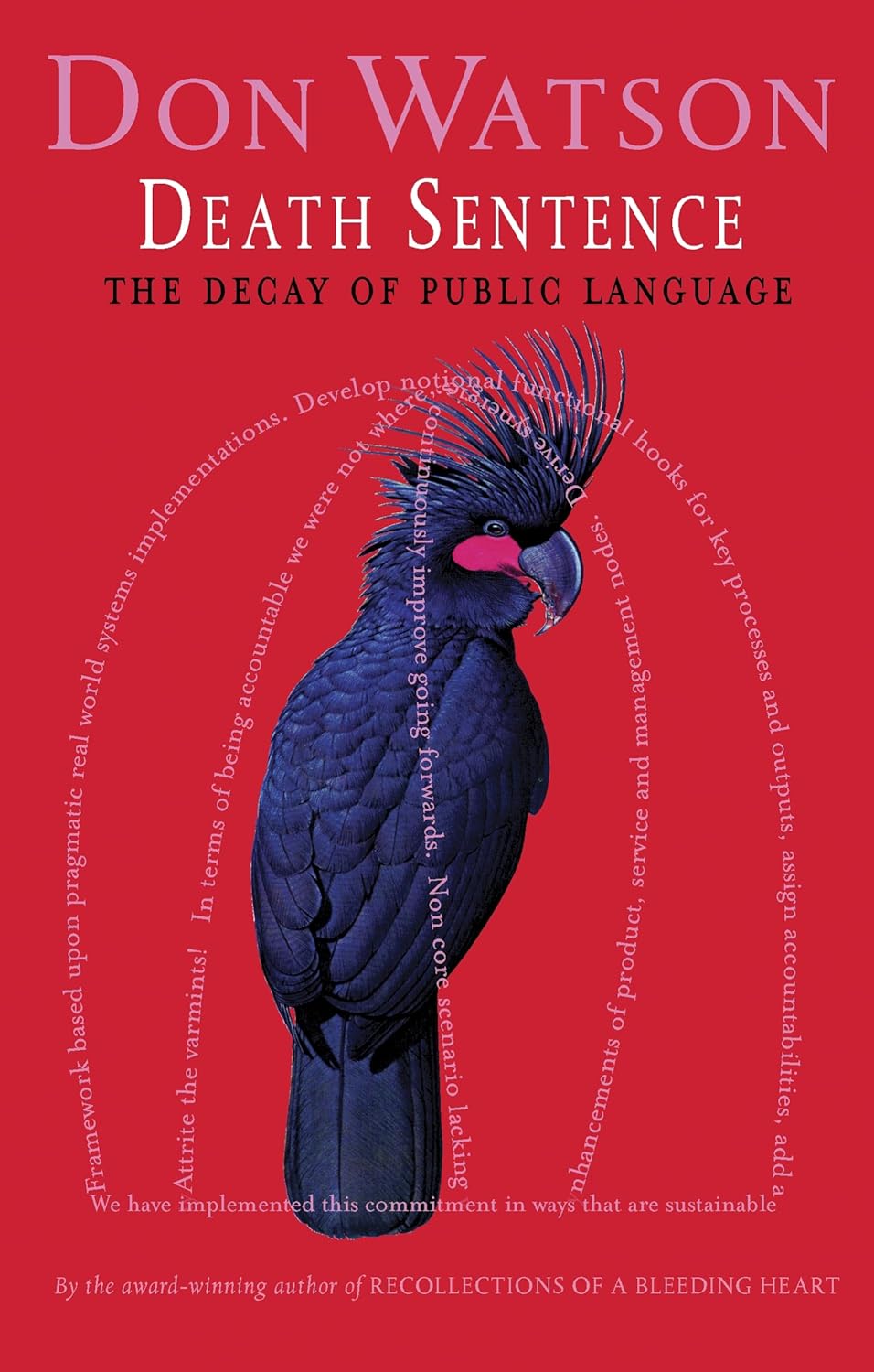
- Free Article: No
- Custom Article Title: Energised Fences
- Review Article: Yes
- Article Title: Energised Fences
- Online Only: No
- Custom Highlight Text:
In 1755 Samuel Johnson published his Dictionary of the English Language. In the preface, he laments the chaotic state of the language: ‘When I took the first survey of my undertaking, I found our speech copious without order, and energetic without rules; wherever I turned my view, there was perplexity to be disentangled and confusion to be regulated.’ He despaired at the scope and futility of his task:
- Book 1 Title: Death Sentence
- Book 1 Subtitle: The decay of public language
- Book 1 Biblio: Knopf, $29.95 hb, 198 pp
- Book 1 Cover Small (400 x 600):

- Book 1 Cover (800 x 1200):

Among these happy mortals is the writer of dictionaries; whom mankind have considered, not as the pupil but the slave of science, the pioneer of literature, doomed only to remove rubbish and clear obstructions from the paths, through which Learning and Genius press forward to conquest and glory, without bestowing a smile on the humble drudge that facilitates their progress. Every other author may aspire to praise; the lexicographer can only hope to escape reproach, and even this negative recompense has been yet granted to very few.
For the next 170 years, things went on much as before, although we dropped long S’s and terminal K’s, and the Americans spiraled off into their own idiosyncrasies.
What Johnson had tried to do for orthography and etymology, Henry Watson Fowler attempted for grammar. In 1926 Fowler brought forth on the world one of the quirkiest books on grammar and style ever published in the English language. Modern English Usage combines erudition and grumpiness in a way unrivalled since Johnson. He set out to expose error and ridicule folly. His manifest irritation is only partly explained by the narrow diet of news available on Guernsey. He understood the difficulty of his task. Under the heading ‘Sturdy Indefensibles’, he wrote:
Many idioms are seen, if they are tested by grammar or logic, to express badly, and sometimes to express the reverse of, what they are nevertheless well understood to mean. Good people point out the sin, and bad people, who are more numerous, take little notice and go on committing it; then the good people if they are foolish, get excited and talk of ignorance and solecisms, and are laughed at as purists; or, if they are wise, say no more about it and wait …
These grumpy old men of the English language concentrated on rules – grammar, orthography and usage – without too much concern about the purposes for which language was deployed. Love poems or business letters; history or journalism: for them, it was all grist for the mill or, as we might say nowadays, input.
Twenty years after the first edition of Modern English Usage, George Orwell took the subject a step further. Whilst he had points to make about idiom, grammar and usage, Orwell also lamented the loss of music in language and the drift towards abstraction and sterility. Orwell’s message was delivered both as an essay, ‘Politics and the English Language’ (1946), and as a novel, Nineteen Eighty-Four (1949). Despite his tart astringency, we quickly forgot his message. It is an astonishing thing that, so soon after Orwell showed the stage tricks used by the main offenders, the trick continues to work on most of us. We sit, most of us, like captivated school-children in sideshow alley, spellbound as the hucksters of language deceive and dissemble. And while we know from Orwell how the tricks are done, we are nonetheless beguiled. Orwell wrote about the misuse of language by politicians:
A mass of Latin words falls upon the facts like soft snow, blurring the outline and covering up all the details. The great enemy of clear language is insincerity. When there is a gap between one’s real and one’s declared aims, one turns as it were instinctively to long words and exhausted idioms, like a cuttlefish spurting out ink.
Don Watson’s new book, Death Sentence: The Decay of Public Language, describes the progress of that disease into all areas of public language: education, commerce, the bureaucracy and politics. Here is an example from the political sphere:
Well, you don’t need powers to ask people questions. You need powers if you need to detain people for that purpose. In this case he was detained by Immigration authorities because of a breach of a — of a visa condition. And he had been – if you go back and look at it, I mean, he was identified by French authorities initially to us on the 22nd of September … [T]he reason for Immigration powers being used is that they were clearly available. He breached visa conditions. It’s not clear, in relation to the powers that have been quite severely circumscribed by the Senate, in terms of the way in which they’re able to operate, that we would have had available evidence for us to use those powers here in Australia at this time.
This quote from Philip Ruddock is drawn from an interview with Laurie Oakes on 2 November 2003. Oakes is one of Australia’s most senior and respected journalists. Ruddock substantially filled the interview with the verbal sludge for which he is justly famous. Nowhere during the interview did Oakes complain that Ruddock made no sense, conveyed no meaning, expressed no ideas.
Clearly, the public language is in trouble. Death Sentence is a dazzling mix of analysis and mockery, gently basted with Watson’s mordant wit. Let a few examples stand for the whole. Here he is on Bob Hawke:
When speaking off the cuff he embarked on his sentences like a madman with a club in a dark room: he bumped and crashed around for so long his listeners became less interested in what he was saying than the prospect of his escape. When at last he emerged triumphantly into the light we cheered, not for the gift of enlightenment, but as we cheer a man who walks away from an avalanche or a mining accident.
And of our current prime minister:
The Prime Minister’s language is platitudinous, unctuous and deceitful. It is in bad taste. If it is not actual propaganda, it has much in common with it … If you construct a collective character and a mythic history and paint over them with invented virtues you also abuse the people: you demean them and deny them their own history … Myths are tempting to those who are in a position to manipulate their fellow human-beings, because a myth is sacred, and what is sacred cannot be questioned. That’s where their power comes from. They simplify and provide meaning without the need of reason … It is about here that they meet clichés which are the myths of language.
This book is more than a book about grammar or usage or style. It advances a deeply important point. Public language has been hijacked to serve a fraudulent purpose: not to communicate ideas but to conceal meaning; not to speak truth but to insinuate falsehood. Whereas educated people once used language as a rapier, it is now used as mustard gas. When senior politicians speak, it is now essential to listen acutely to appreciate that they are simply staying on message whilst avoiding truth, accuracy or anything remotely approaching an answer to the question they have been asked. Even when they appear to be answering the question, you have to look very closely to see which part of the question they are answering. Remember the skilful evasions of Mr Howard when he was asked a certain question in parliament:
ANNA BURKE, MEMBER FOR CHISHOLM: Prime Minister, was the Government contacted by the major Australian producer of ethanol or by any representative of him or his company or the industry association before its decision to impose fuel excise on ethanol?
JOHN HOWARD, PRIME MINISTER: Speaking for myself, I didn’t personally have any discussions, from recollection, with any of them.
A document obtained by the Opposition records a meeting between John Howard and Dick Honan about ethanol, just six weeks before the decision. But Mr Howard says he spoke the truth; that his answer related to a different part of the question and that he has been taken out of context.
This same inclination to use language in order to deceive has infected the public service. At a public meeting in April 2002 I had the opportunity to debate aspects of refugee policy with one Philippa Godwin, Deputy Secretary of the Department of Immigration. Godwin is clearly a woman of great intelligence. I asked her a question about a fence that surrounds the Baxter Detention Centre (that is, the Baxter Immigration Reception and Processing Centre). The fence is described on a plan of Baxter as a ‘courtesy fence’. I suggested that it was in fact an electric fence. ‘No,’ she insisted. ‘It is not an electric fence. It is an energised fence.’ A 9000-volt energised fence.
Some surprising things happened in the world after September 11. First, we discovered that terrorism exists. Second, Australia discovered that it could emerge from obscurity to become a terrorist target, by helping the US invade Afghanistan and later Iraq. Having lifted Australia’s profile from irrelevance to deputy sheriff, Mr Howard was moved to write a letter to all Australian households assuring us that we are safe whilst warning us to be careful. In a devastating, sustained deconstruction of that letter, Don Watson nails once and for all the decay of public language:
Dear Fellow Australian,
I’m writing to you because I believe you and your family should know more about some key issues affecting the security of our country and how we can all play a part in protecting our way of life … As a people we have traditionally engaged the world optimistically … our open, friendly nature makes us welcome guests and warm hosts.
Here is part of what Watson says of this greasy prose:
This rose-coloured boasting smells of some nightmare ministry of information … the phrase as a people might not be a lie, but it smells like one … The people of Australia is not so rank because it does not carry the suggestion that some mythic or historic force unites us in our destiny. But if we must have as a people, then traditionally has to go, and not only because optimistically is sitting on top of it. It has to go because it is so at odds with Australian history it could be reasonably called a lie … Traditionally we built barriers against the world we are alleged to have engaged so optimistically; traditionally we clung to the mother country for protection against that same world; traditionally … we took less of an optimistic view of the world than an ironic, fatalistic view of the world … The smugness of the sentence about our being lovely guests and warm hosts is so larded by fantasy and self-delusion, it transcends Neighbours and becomes Edna Everage … It will occur to some readers, surely, that it has been our nature recently to play very cold hosts to uninvited guests, the sort of people we don’t want here, who throw their children into the sea, who are not fun-loving, welcoming, warm, sunny, etc. … Thus – as a people Australians are very nice; people who don’t agree with this proposition are not nice people; people who are not nice are not Australians in the sense of Australians as a people. People who are not prepared to be Australian as a people should shut up or piss off back where they came from.
All Australians should read this book. All Australians should be grateful that it has been written.


Comments powered by CComment